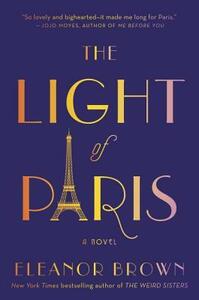Take a photo of a barcode or cover
Art, life, love, Paris
A beautifully written story about a woman coming to terms with her choices as she learns her grandmother's story. Very enjoyable read.
A beautifully written story about a woman coming to terms with her choices as she learns her grandmother's story. Very enjoyable read.
I excited to read this book originally when I picked it out because of the I thought The Light of Paris was going to be about how Madeline broke free of her toxic relationship with the wisedom she gained while reading her grandmother’s diary. While The Light of Paris followed the plot I expected I found it to be a slow read. I personally found the part of the novel that was in Madeline’s grandmother,Margie’s, perspective more interesting than the sections from Madeline’s perspective.
This novel used different types of tones in Madeline and Margie’s perspectives. While Madeline’s sections consisted of a dreary tones, Magrie’s sections consisted of a hopeful and joyful tones. The difference in the tones illustrates the theme of the importance of following your dreams and the effect that has on a persons happiness.I would recommend this book to a person who loves travel and France but is prepared for a slow read.
This novel used different types of tones in Madeline and Margie’s perspectives. While Madeline’s sections consisted of a dreary tones, Magrie’s sections consisted of a hopeful and joyful tones. The difference in the tones illustrates the theme of the importance of following your dreams and the effect that has on a persons happiness.I would recommend this book to a person who loves travel and France but is prepared for a slow read.
How can this possible be written by the same author who wrote The Weird Sisters? There are no similarities whatsoever! I loved The Weird Sisters but could find nothing redeeming about this book. Are there really people like the main characters in this book? If so, I've never met them. Many of my family members (myself included) and friends attended private schools, made debuts, had fashionable weddings, served on volunteer committees, etc.; but not a single one of them ever acted like the characters in this book. None are wimpy like the main character - quite the opposite.
Margie is coming of age just after WWI. Madeleine is in her 30s just before the year 2000. Grandmother and granddaughter are each struggling with parents, expectations, etc. I really wanted to scream at Madeleine. She married because it was expected of her and she remained in a marriage because she didn't want to embarrass anyone by getting a divorce. Seriously? I can understand that at the beginning of the 20th century but not at the end. Ms. Brown tried to make a strong case for her emotional issues and lack of self-esteem that lead to these feelings, but that didn't make me any more accepting of the behaviour. The story is written from Madeleine's point of view as herself and as she is reading Margie's diaries. I was more interested in Margie's story of escaping to Paris and finding herself there, maybe because I felt she had less control over her life. The descriptions of Paris were wonderful and I loved how Margie was enchanted as she uncovered the many layers of the city.
A preview copy of this book was provided by NetGalley and Penguin Group Putnam.
A preview copy of this book was provided by NetGalley and Penguin Group Putnam.
Just ok. The story didn't stand out for me. A woman finds her grandmother's journals packed away in the attic and discovers that she was once a very different woman than the one she'd known. Who hasn't read that before?
A love story in Paris during the Jazz Age ...of course I was drawn to that! But I found the main character of modern day, Madeline, to be almost pathetic at times. She is "trapped" in her rich girl, loveless, and controlling marriage. Her mother's disapproval & her acceptance of it seems outdated & unbelievable. In the author's attempt to make her appear in sync with her 1920's counterpart, Margie her grandmother, she instead looked like she was plucked from that time and just dropped into 1999. Maybe 1959 would've been more believable. I almost expected a description of her outfit to contain a corset because that's how outdated her traits & interactions appeared. Her relationships are complete emotional abuse. Still, her internal talk is simply annoying. "What will I do?, who will I be? No one will marry me, I can't eat cake or someone will say I'm fat.." Can you sense my eye rolls? Neither female character seemed to think much of herself so it was difficult to connect. My overall feeling toward them was frustration.
The setting and story itself, although nothing new, kept me reading. But it is a tired storyline, with only moderately interesting characters with what I consider questionable likability.
A love story in Paris during the Jazz Age ...of course I was drawn to that! But I found the main character of modern day, Madeline, to be almost pathetic at times. She is "trapped" in her rich girl, loveless, and controlling marriage. Her mother's disapproval & her acceptance of it seems outdated & unbelievable. In the author's attempt to make her appear in sync with her 1920's counterpart, Margie her grandmother, she instead looked like she was plucked from that time and just dropped into 1999. Maybe 1959 would've been more believable. I almost expected a description of her outfit to contain a corset because that's how outdated her traits & interactions appeared. Her relationships are complete emotional abuse. Still, her internal talk is simply annoying. "What will I do?, who will I be? No one will marry me, I can't eat cake or someone will say I'm fat.." Can you sense my eye rolls? Neither female character seemed to think much of herself so it was difficult to connect. My overall feeling toward them was frustration.
The setting and story itself, although nothing new, kept me reading. But it is a tired storyline, with only moderately interesting characters with what I consider questionable likability.
hopeful
inspiring
reflective
slow-paced
Strong character development:
Yes
Loveable characters:
Yes
Flaws of characters a main focus:
Yes
hopeful
inspiring
reflective
medium-paced
Loveable characters:
Yes
I hated Madeline! Get the fuck over yourself! Margie was far more interesting, but I ultimately couldn't stand this book. It filled me with rage....This book was all:
"I'm rich, and my husband is kind of mean-ish and I wanna paint, but I'm too busy being a doting wife!"
"leave him and do you!"
"No, it's 1999, and my mother will be so ashamed if I get divorced and I don't want to listen to my husband bitch" (insert eye roll!)
&
"I'm rich and not that pretty and my parents want to marry me off but I don't wanna leave Paris!"
"Stay in Paris and do you!"
"Nah, I'm gonna complain but ultimately go home and get married to the guy I met once but haven't seen in years"
"I'm rich, and my husband is kind of mean-ish and I wanna paint, but I'm too busy being a doting wife!"
"leave him and do you!"
"No, it's 1999, and my mother will be so ashamed if I get divorced and I don't want to listen to my husband bitch" (insert eye roll!)
&
"I'm rich and not that pretty and my parents want to marry me off but I don't wanna leave Paris!"
"Stay in Paris and do you!"
"Nah, I'm gonna complain but ultimately go home and get married to the guy I met once but haven't seen in years"
"And I thought, this. This life where I had the space to find the things that were important to me instead of the things I was forced to do. This life where I was surrounded by friends who believed in art and food and community and who believed, fiercely, in me. This life with the endless, terrifying, happiness of possibility before me, and the light of Paris guiding me home" (306).







